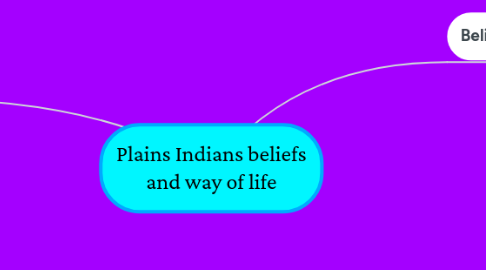
1. Beliefs
1.1. Nature
1.1.1. Everything in nature has a spirit.
1.1.2. Humans are part of nature and should work with other spirits rather than trying to tame nature.
1.1.3. 'Spirit animals' can guide humans on vision quests.
1.2. Land & Property
1.2.1. Land was sacred and the mother of the Plains Indians.
1.2.1.1. Some Land were very sacred such as 'Black Hills of South Dakota'.
1.2.2. Some Plains farmed lands but others hunted, fished and gathered.
1.2.2.1. Farming plots belonged to the tribe and not the family.
1.2.2.2. Land was never bought or sold
1.2.3. Treaties between tribes agreed that they could share hunting lands.
1.2.3.1. Food resources were sometimes scarce and conflicts occurred as tribes who would push onto each other's hunting land.
1.2.4. Some tribes viewed farming and mining as unacceptable. They believed it disrupted the sacred spirit.
1.3. War
1.3.1. Indians would compete with each other for resources on the Plains.
1.3.2. Raids would only go ahead if they had a chance of success. Young men were important to the survival of the tribe so if there was too much opposition they were trained to escape quickly.
1.3.3. only selected brotherhoods would go on a raid, this would reduce the loss a tribe would suffer in an unsuccessful raid.
1.3.4. 'Counting Coup' was a way of fighting which did not result in death or injury. The purpose of the counting coup was to touch your opponent and therefore win.
2. Way of life
2.1. Plains Indian Society
2.1.1. Indians were organised into a tribes, some where so large they were called 'nations' for example the Sioux.
2.1.2. Tribes were made up of bands which could be several hundred people or just 30 people.
2.1.3. Bands and tribes worked together and would meet every summer to discuss important matters such as war.
2.1.4. Chiefs led a tribe. They were valued for their wisdom, leadership, warrior skills or spiritual powers.
2.1.5. A band chief was responsible for guiding the tribe away from danger.
2.1.6. Chiefs could not make decisions without agreeing it with the council.

